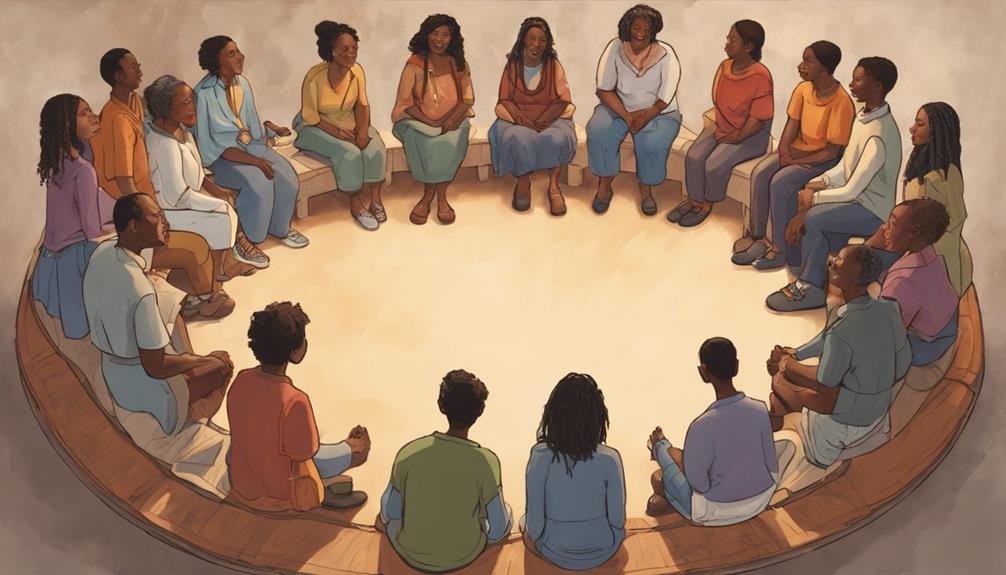As we navigate the complexities of interpersonal relationships, we often find comfort in shared experiences and insights. However, what if the support we seek lies within a realm of hidden truths and subtle manipulations?
Discovering covert narcissist support groups can unveil a world where understanding and healing intertwine. These groups provide a safe haven for those impacted by covert narcissism, offering a platform to connect, learn, and grow.
Join us on this journey as we uncover the power of community in navigating the challenges posed by covert narcissistic behaviors.
Key Takeaways
- Seek specialized support groups for covert narcissism to address relationship impacts effectively.
- Joining groups reduces isolation, offering validation and guidance in the healing journey.
- Choose groups providing safe spaces for sharing without judgment to foster recovery.
- Participation in support groups empowers individuals, aids in healing, and promotes self-worth.
Understanding Covert Narcissism Support Groups
In understanding covert narcissism support groups, individuals gather in safe spaces to share experiences and embark on a journey towards healing and recovery. These groups specifically focus on addressing the traits associated with covert narcissism and how they impact relationships. Participants often come seeking validation, understanding, and guidance as they navigate the complexities of covert narcissistic abuse in their lives. Through open discussions and shared stories, members empower one another to recognize the subtle manipulation and emotional abuse often inflicted by covert narcissists. This process helps participants to learn how to establish and maintain covert narcissist boundaries, a crucial step in protecting their emotional well-being. By setting these boundaries, individuals can regain a sense of control over their lives and foster healthier, more authentic relationships moving forward.
Within these support groups, individuals work together towards recovery, emotional healing, and the establishment of healthy boundaries that may have been eroded by the covert narcissist in their life. The shared experiences within the group foster a sense of community and understanding, which can be pivotal in the healing process. Whether led by professionals or peers who comprehend the dynamics of narcissistic abuse, these support groups offer a lifeline for individuals seeking to break free from the cycle of manipulation and regain their sense of self-worth.
Benefits of Joining Support Groups

Exploring the Benefits of Joining Support Groups offers covert narcissism survivors a pathway to healing, connection, and empowerment amidst the challenges they face. Support groups provide a crucial safe space for individuals to share their experiences of emotional abuse, particularly prevalent in relationships with covert narcissists. By joining these groups, survivors can reduce feelings of isolation and loneliness, which are common struggles in the aftermath of such toxic dynamics. The group sessions not only validate their experiences but also offer invaluable guidance, understanding, and encouragement throughout the healing process.
Moreover, support groups create a platform for survivors to connect with others who've endured similar forms of covert narcissism. This sense of community helps individuals realize they aren't alone in their struggles. Being part of a support group can significantly boost self-esteem by fostering a sense of belonging and understanding. Ultimately, these groups play a pivotal role in aiding covert narcissism survivors in navigating their healing journey and reclaiming their sense of self-worth.
Finding the Right Support Group
To identify an appropriate support group for addressing covert narcissism, individuals should prioritize seeking out specialized groups that cater to the unique challenges associated with this form of emotional abuse. When looking for the right support group, consider the following key factors:
- Specialization: Look for groups that specifically focus on covert narcissism to ensure the issues are addressed effectively.
- Experienced Leadership: Seek out groups led by individuals with experience and understanding of the dynamics of covert narcissism.
- Safe Environment: Choose groups that provide a safe and supportive space for members to share their experiences without judgment.
- Healing Focus: Consider groups that emphasize healing, recovery, and personal growth to aid in overcoming the impacts of narcissistic abuse.
Navigating Support Group Resources

Navigating the available support group resources requires careful consideration of the group's focus, leadership, and environment to ensure effective assistance for survivors of covert narcissistic abuse. When seeking support groups for healing and recovery from covert narcissistic abuse, it's essential to look for those that offer a safe and validating space for sharing experiences. These groups typically focus on empowering individuals, providing emotional support, and offering guidance tailored to addressing the challenges of covert narcissism.
Whether peer-led or professional-led, support groups play a vital role in fostering community connection and providing valuable insights and coping strategies. Joining a support group can help individuals navigate the complexities of covert narcissistic abuse while promoting healing and growth. By participating in these sessions, survivors can find solidarity, validation, and tools to aid in their recovery journey. Ultimately, support groups serve as a beacon of hope and understanding for those grappling with the aftermath of covert narcissistic abuse.
Strategies for Coping With Covert Narcissism
Developing healthy boundaries remains a crucial strategy for coping with covert narcissism and safeguarding oneself from manipulation. In the journey of dealing with Narcissistic Personality Disorder, it's essential to establish clear limits to protect one's well-being and maintain healthy relationships.
Additional strategies for coping with covert narcissism include:
- Seeking therapy: Professional help can provide valuable insights and tools to navigate the complexities of covert narcissistic behaviors within oneself or others.
- Practicing self-awareness: Being mindful of one's thoughts, emotions, and behaviors aids in identifying and addressing covert narcissistic tendencies.
- Learning assertive communication: Developing the ability to communicate confidently and effectively can empower individuals to assert boundaries in relationships with covert narcissists.
- Prioritizing self-care: Engaging in activities that promote mental well-being and self-care practices can be crucial in coping with the challenges posed by covert narcissism in an abusive relationship.
Frequently Asked Questions
What Hurts a Covert Narcissist the Most?
When criticism or rejection strike, it wounds a covert narcissist deeply, challenging their fragile self-esteem and sense of superiority.
Invalidating or ignoring them threatens their need for attention and admiration.
Failing to meet their unrealistic expectations can devastate their self-image.
Confronting them with accountability or exposing their manipulation tactics triggers intense shame and inadequacy.
Shattering their facade of charm and empathy is distressing for a covert narcissist.
What Upsets a Covert Narcissist?
What upsets a covert narcissist is primarily threats to their perceived self-image or sense of superiority. Criticism, rejection, or exposure of vulnerabilities can trigger their fragile self-esteem.
Ignoring them or not providing expected admiration can also lead to distress. Any hint of disloyalty or betrayal is deeply upsetting, often resulting in defensive or aggressive reactions.
Understanding these triggers can help navigate interactions with covert narcissists more effectively.
Is There Any Hope for a Covert Narcissist?
Absolutely, there's hope for covert narcissists. By acknowledging our behavior and seeking support, we can make positive changes.
Therapy and support groups offer valuable tools for growth. With dedication and self-awareness, we can learn healthier relationship dynamics and coping mechanisms. It's a journey of self-discovery and healing, but with willingness, progress is possible.
Embracing empathy and seeking help are key steps towards personal growth and transformation.
Do Covert Narcissist Know What They Are Doing?
Yes, covert narcissists are often unaware of the full extent of their manipulative behaviors. They may not recognize the harm they cause or understand the underlying motives behind their actions. This lack of self-awareness can make it challenging for them to acknowledge their behavior and its impact on others.
It's important to approach interactions with covert narcissists with patience and understanding, as they may not intentionally know what they're doing.
Conclusion
In conclusion, we've learned that navigating covert narcissist support groups can be both challenging and enlightening. By setting boundaries, practicing empathy, and seeking therapy, individuals can work towards healing and recovery.
Remember, joining a support group isn't a magic cure-all, but rather a helpful tool in your journey towards understanding and coping with covert narcissism.
So, grab your empathy cape and therapy sword, and let's slay those narcissistic dragons together!









